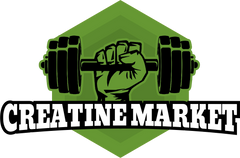Creatine hydrochloride, commonly known as creatine HCL, represents one of the newer innovations in creatine supplementation. As a modified form of creatine bound with hydrochloric acid, this supplement has gained attention for its unique properties and potential benefits. This comprehensive guide by the team at Creatine Market explores everything you need to know about creatine HCL, from its fundamental characteristics to practical usage guidelines.
What is Creatine HCL?
Creatine HCL is a form of creatine that has been bound with hydrochloride to create a more soluble compound. This molecular modification changes how the supplement behaves in water and, potentially, in your body. The addition of the hydrochloride group creates a more acidic environment, which manufacturers claim enhances absorption and reduces the need for loading phases.
How Creatine HCL Works
The science behind creatine HCL centers on its enhanced solubility and proposed superior absorption rates. When you consume creatine HCL, the hydrochloride component theoretically helps the creatine molecule pass through cellular membranes more efficiently. This process stems from the supplement's increased water solubility and the creation of a concentration gradient that may facilitate absorption.
Pros and Cons of Using Creatine HCL
Here are a few of the most known pros and cons when it comes to using Creatine HCL as a supplement in your fitness regimen:
Pros of Creatine HCL
Enhanced Solubility
Creatine HCL dissolves more readily in water compared to traditional creatine monohydrate. This improved solubility means less powder settling at the bottom of your shaker cup and potentially better mixing properties overall.
Lower Effective Dosage
Due to its proposed superior absorption rates, creatine HCL typically requires smaller doses to achieve similar effects. While monohydrate users often take 5 grams daily, HCL users may only need 1.5 to 3 grams for comparable results.
Reduced Bloating
Some users report experiencing less bloating and gastrointestinal discomfort with creatine HCL compared to monohydrate. This benefit may be particularly relevant for those with sensitive stomachs or those who have experienced digestive issues with other forms of creatine.
No Loading Phase Required
Unlike traditional creatine monohydrate, creatine HCL generally doesn't require a loading phase. Users can start with their regular maintenance dose immediately.
Cons of Creatine HCL
Higher Cost
Creatine HCL typically costs significantly more than creatine monohydrate. Even with lower dosing requirements, the price per serving often remains higher than traditional forms.
Limited Research
While creatine HCL shows promise, it lacks the extensive research backing that creatine monohydrate enjoys. Most benefits remain theoretical or based on manufacturer claims rather than peer-reviewed studies.
Taste Considerations
The acidic nature of creatine HCL can create a tart or slightly bitter taste, which some users find less pleasant than unflavored monohydrate.
Dosage Guidelines For Creatine HCL
Recommended Dosage:
The standard recommendation for creatine HCL supplementation typically ranges from 1.5 to 3 grams daily. This reduced dosage, compared to monohydrate, stems from the claimed improved absorption rates. However, individual needs may vary based on factors such as body weight, activity level, and training intensity.
The Best Time to Take Creatine HCL
While specific timing isn't crucial for results, many users find taking creatine HCL around their workout provides the best experience. Consider these general guidelines for timing:
-
Pre-workout: Taking it 30 minutes before exercise may help with uptake during training
-
Post-workout: Consuming it after training can take advantage of increased nutrient absorption
- With meals: Taking it with food may help minimize any potential stomach discomfort
Safety and Side Effects
Creatine HCL demonstrates a strong safety profile, though research isn't as extensive as with monohydrate. Most users experience minimal side effects, but potential considerations include:
-
Stomach Sensitivity: While generally well-tolerated, some users may experience initial digestive adjustment periods. Starting with a lower dose and gradually increasing it can help minimize any discomfort.
- Hydration Requirements: As with all forms of creatine, proper hydration remains important. Though HCL may require less water for mixing, maintaining adequate daily water intake supports optimal results.
How to Choose Quality Creatine HCL
When selecting a creatine HCL supplement, consider these key factors:
Manufacturing Quality
Look for products from reputable manufacturers that follow Good Manufacturing Practices (GMP) and provide third-party testing verification. Quality control becomes particularly important with more expensive supplements like creatine HCL.
Product Purity
Choose products that clearly state their creatine HCL content and avoid those with unnecessary fillers or proprietary blends. Pure creatine HCL should be the primary or only ingredient listed.
Creatine HCL vs Different Forms of Creatine
Understanding how creatine HCL compares to other forms helps inform your supplementation choices. While HCL offers certain advantages, different forms of creatine set important benchmarks:
Absorption: HCL claims superior absorption, though monohydrate already demonstrates excellent absorption rates of approximately 95%. The real-world performance difference remains debatable.
Dosing: HCL suggests 1.5-3g per day. However, total creatine uptake appears similar between different forms.
Cost: Monohydrate offers significantly better value, often costing 3-4 times less per serving than HCL. Even with HCL's lower dosing requirements, monohydrate remains more economical.
Research: Monohydrate boasts decades of research supporting its efficacy, while HCL's scientific backing remains limited in comparison.
Best Ways to Use Creatine HCL
Mixing It
Mix creatine HCL with 6-8 ounces of water or your preferred beverage. Its higher solubility means it should dissolve more easily than monohydrate. Some users prefer including it in their pre or post-workout shake for convenience.
Supplement Stacking
Creatine HCL can be effectively combined with other supplements such as: Pre-workout ingredients for enhanced training performance Post-workout protein for muscle recovery and growth Essential amino acids for improved protein synthesis
Who Should Consider Creatine HCL?
Creatine HCL may be particularly suitable for:
- Athletes and fitness enthusiasts who experience digestive issues with monohydrate
- Those seeking a more soluble form of creatine
- Individuals willing to pay premium prices for potentially improved absorption
- People who prefer lower-volume supplementation
Conclusion
Creatine HCL offers an alternative approach to creatine supplementation that may benefit certain users, particularly those sensitive to traditional monohydrate or seeking improved solubility. While its higher cost and limited research base require consideration, many users report positive experiences with this form of creatine.
When deciding whether to use creatine HCL, weigh the potential benefits against the increased cost and limited research compared to monohydrate. Consider your individual needs, budget, and sensitivity to different supplement forms. Remember that consistency in supplementation, combined with proper training and nutrition, remains key to achieving your fitness goals, regardless of which form you choose.




